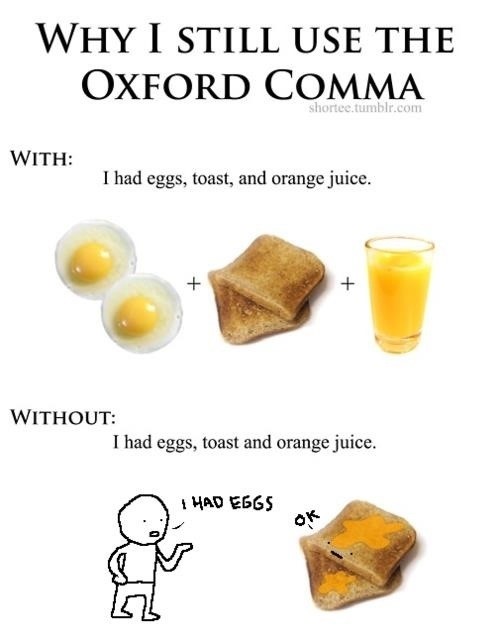Who Decides These Things? Great Grammar Battles in Content Marketing History
 The next time you’re in the mood for a passionate debate, ask someone how they feel about the Oxford comma.
The next time you’re in the mood for a passionate debate, ask someone how they feel about the Oxford comma.
EnVeritas Group boasts a bounty of experienced writers, avid readers, and grammar aficionados (Note rebellious Oxford comma). I decided to pick the collective brain and determine the state of the union on the most divisive grammar issues of our time.
Let’s start with one of the less polarizing topics.
1. Active vs. Passive Voice
A common best-practices mantra among professional writers is to favor the active voice over passive voice. (If you need a quick a refresher, Grammar Girl has an excellent post on the subject.)
Arguments for active voice usually cite readability, brevity, and clarity. Fair enough.
But! What if you want to be vague? That’s where passive voice can work to your advantage. Politicians tend to use it a lot for this very reason; passive voice is a good way to work in buzzwords without saying much.
Perhaps you’ve heard the argument that science and medical writing are realms where passive voice is very appropriate. In general, a research report or a medical article should be objective, and passive voice can create distance between the writer and his or her prose.
However, the American Psychological Association (APA), which authors the predominant style guide for publications in social sciences, states: “Verbs are vigorous, direct communicators. Use the active rather than the passive voice, and select tense or mood carefully.”
So there! Just kidding. There are a lot of style guides out there, but I personally have yet to come across one that promotes passive voice over active voice, even in science and medicine. (If you know of one, please tell me in the comments!)
Our writer Jeanne Petrizzo mentions context as a key deciding factor: “I’d be more insistent of active voice for a hard news/journalistic style. Creative writing? You do you.”
Consider the last line of The Great Gatsby, with its smidge of passivity:
“So we beat on, boats against the current, borne back ceaselessly into the past.” Tear, sniffle.
Rewritten as active:
“So we boats beat on against the current, which ceaselessly bears us back into the past.” Meh.
Verdict: Write in active voice unless you are a politician or as good as F. Scott Fitzgerald.
2. Ending a Sentence with a Preposition Is Something up with Which I Will Not Put
This is a rule of which everyone seems to have heard, but no one seems to know from where it came.
Yeah.
I know, I know—I could rewrite that statement to limit the awkwardness and to accommodate the “rule”: “Everyone seems to have heard this rule; however, no one seems to know its origin.” Still, arbitrary rules tend to rub me the wrong way.
Content Strategist Stacy Dyer weighs in: “Sentences that are worded just so the preposition doesn’t come at the end usually sound awkward.”
That said, our most experienced writers appear unified in their opposition to ending sentences with prepositions. Senior Project Manager Kathleen Gossman’s view is: “When I was learning the rules, one never ended a sentence with a preposition. Never ever. End of story.” Even our Human Resources Manager, Martha Bowen, proudly proclaims to be “Old school, baby” and in the “don’t do it” camp.
Verdict: In formal writing, avoid ending sentences with prepositions, even if only because the people who care about this REALLY care about it.
3. The Freaking Oxford Comma
If you’re having a slow day at work and want to stir things up, drop the “O” bomb. I could easily write a whole post on this, or even a book.
Turns out the Oxford comma, also known as the “final serial comma” and by a few other names, is the third rail of grammar politics. I think Social Security reform is a safer topic. Maybe even Obamacare (maybe not).
The EVG office is staunchly divided on this subject, and I have a hypothesis.
Human beings fall into two groups: Haters of Ambiguity and Haters of Excess.
If you hate ambiguity, you, like Project Manager Laura Lee, love the Oxford comma:

If you are somewhat minimalistic and abhor excess, then like writer Jeanne Petrizzo, you see no need to create “unnecessary comma drama.” Why add a comma if the sentence is already clear?
Verdict: Since the comma took up SO much space in newspapers, sometimes clients or editors can force us to omit the Oxford comma and everyone will just look the other way.
As if it is OK. As if the world is not crumbling down around us, and there’s nothing left to fight for anymore.
The end.
Enjoy this post? Read more from Kristen Jackson.
Kristen Jackson—Editor



